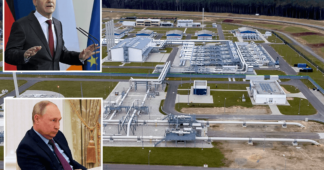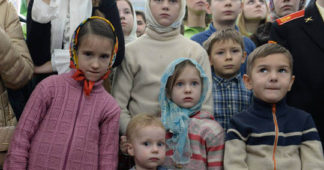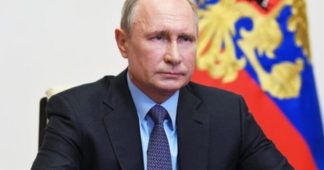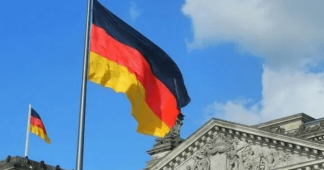Germany to Boost Military Spending in Latest Historic Shift
By Birgit Jennen, Alexander Pearson and Arne Delfs
Feb 27, 2022
(Bloomberg) — Chancellor Olaf Scholz announced plans for a massive boost in defense spending in the latest historic policy shift in Germany triggered by Russia’s invasion of Ukraine.
Germany will channel 100 billion euros ($113 billion) this year into a fund to modernize the military, Scholz said Sunday in a speech to a special session of the lower house of parliament. By 2024, the government will spend at least 2% of gross domestic product each year on defense, he added, in line with a NATO target that Berlin has consistently failed to meet.
Scholz had been widely criticized by opponents and allies alike in recent weeks for what they perceived as dithering and weakness in the face of Russia’s mounting aggression toward Ukraine. In the past few days he has announced a series of radical changes to long-entrenched German policies following the full-scale attack ordered by Russian President Vladimir Putin on the former Soviet republic.
Even before the invasion, Scholz halted the certification process for the Nord Stream 2 pipeline built to bring more of the Russian gas his country heavily relies on. On Saturday, he abandoned Germany’s traditional rejection of supplying weapons to conflict zones and gave way on expelling Russian banks from SWIFT, the system used for trillions of dollars worth of transactions between thousands of banks around the world. The willingness to supply Ukraine with military equipment including surface-to-air missiles and anti-tank weapons is in many ways the most dramatic move.
Such a wide-ranging rethink from Scholz and his government came unexpectedly and prompted suggestions that Europe’s biggest economy may finally be ready to punch its weight in the international arena, discarding decades of reluctance linked to its role in the 20th century’s bloodiest conflicts. Ukraine’s ambassador to Germany, who was in parliament Sunday, called it a “truly historic moment.”
“With the invasion of Ukraine, we are in a new era,” Scholz, the Social Democrat who took over from Angela Merkel in December, told lawmakers. “On Thursday, President Putin created a new reality with his invasion of Ukraine. This new reality requires a clear response. We have given it.”
Germany’s Pivot:
“100 billion euros for new fund for military spendingAnnual defense outlays to rise to more than 2% of GDPWork with EU partners to build fighter jets, tanksPurchase armed Heron drones from IsraelIncrease gas storage volume by 2 billion cubic metersPurchase additional natural gas on the world marketsEstablish a national coal and gas reserveBuild LNG terminals in Brunsbuettel and Wilhelmshaven”
German defense spending in recent years has been hovering at around 1.5% and actually declined slightly as a share of output last year, according to NATO figures.
That has led to criticism that the armed forces are consistently underfunded. Germany has reduced the number of its battle tanks to 300 from 4,700 since 1989 and the number of warplanes to 230 from 390, according to a report in Der Spiegel magazine. The number of troops has dropped to 180,000 from more than 300,000.
Friedrich Merz, the leader of Merkel’s Christian Democrats, signaled Sunday in his speech to parliament that the party is ready to work with the ruling coalition on agreeing the financing for the defense fund.
As well as ramping up defense spending, Scholz also pledged to do more to protect energy supplies, including increasing gas-storage volume by 2 billion cubic meters, establishing a national coal and gas reserve and swiftly constructing two LNG terminals on the north coast.
There are signs public opinion is firmly behind the chancellor and his two partners in the ruling coalition — the Greens, who control the foreign and economy ministries, and the business-friendly Free Democrats, who run the finance ministry.
About 100,000 people streamed through the Brandenburg Gate to the central Tiergarten park Sunday for a demonstration in support of Ukraine, according to police estimates. Authorities had expected as many as 20,000. Many had Ukrainian flags and banners calling on Putin to stop the war.
Johannes Boie, the editor in chief of influential tabloid Bild, published an editorial entitled “Germany Delivers!” in which he praised the government’s decision to supply Ukraine with weapons.
“Our country owes its prosperity, its happiness, to the fact that the Allies once erased our own mass-murdering dictator from the map,” Boie wrote.
“Today the government took a first step,” he added. “Slowly, hesitantly, but still. Keep it up – even faster! Even braver!”
While Scholz looks to have set aside his preference for circumspection and prudence, at least for the time being, his calm, careful approach has often stood in recent weeks in stark contrast to the two senior Green Party ministers in his government.
Foreign Minister Annalena Baerbock and Robert Habeck, who is the economy minister and vice chancellor, have been far more outspoken about the need to confront Russia, particularly on issues like Nord Stream 2.
Scholz also had to overcome a degree of reluctance to punish Russia within his own Social Democratic party, which has a long history of sympathy toward Moscow.
Baerbock said Sunday that now is the “right moment” for Germany to make what she called a “180-degree turn in foreign policy.”
“If our world is different, then our politics must also be different,” she said in a speech to the special session of parliament.
“Perhaps it is the case that Germany is today leaving behind a form of special restraint in foreign and security policy,” she added. “In choosing between war and peace — in choosing between an aggressor and children who have to hide from bombs in subways — no one can be neutral.”
Published at www.msn.com
We remind our readers that publication of articles on our site does not mean that we agree with what is written. Our policy is to publish anything which we consider of interest, so as to assist our readers in forming their opinions. Sometimes we even publish articles with which we totally disagree, since we believe it is important for our readers to be informed on as wide a spectrum of views as possible.












